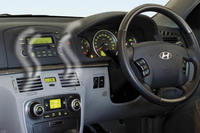Carmakers Urged to Opt for the Sustainable Solution in "The Cool War"
BRUSSELS, June 18 -- With the potential to knock out 1% of global greenhouse gases, the world's automotive manufacturers are being urged to opt for the sustainable solution in "The Cool War" as they make their decision over which new refrigerant to adopt for air conditioning in cars in the coming weeks.
"CO2 Technology outperforms competing chemical refrigerants on all three counts", states Wolfgang Lohbeck, Greenpeace's Head of Technical Innovations and Projects. "It is more environmentally friendly, more technically ready and more cost-efficient than competing chemical refrigerants. The danger is that a chemical blend such as Fluid H, DP1, or AC1 prevails due to a focus on short term cost savings and as chemical companies employ delaying tactics to try to buy time to develop new substances that they can profit from."
Worth $14.5 billion in 2007, the battle for the air conditioning market for passenger cars emanates from the decision to phase out the current chemical refrigerant HFC-134a. Having a global warming potential over 1,400 times higher than that of CO2 Technology, the EU MAC Directive has legislated the phase-out of HFC-134a from January 2011 onwards. To comply with the Directive carmakers have to decide today on a new refrigerant as they typically need 3-4 years to develop new car platforms including the new air conditioning systems.
"From the perspective of environmental protection, we see CO2 Technology as the only viable solution for car air conditioning", said Jurgen Resch, Head of the German NGO Deutsche Umwelthilfe. "By using a CO2- based air conditioning system, total car emissions can be reduced by up to 10%."
"Moreover other sectors are adopting a wait-and-see approach", he continues. "If the car industry opts for CO2 Technology then we are likely to see it also being adopted by the manufacturers of vending machines, supermarket cabinets, heat pumps for domestic water heating, industrial refrigeration, to name but a few. At this level of uptake, CO2 Technology has the potential to remove 3% of the world's greenhouse gases. In essence CO2 Technology is taking the problem and turning it into part of the solution."
Today CO2 is released as an industrial waste product directly to the atmosphere. By re-using it for cooling and heating a car, this CO2 becomes environmentally neutral. By contrast, competing chemical alternatives have to be manufactured from scratch with all accompanying environmental burdens.



